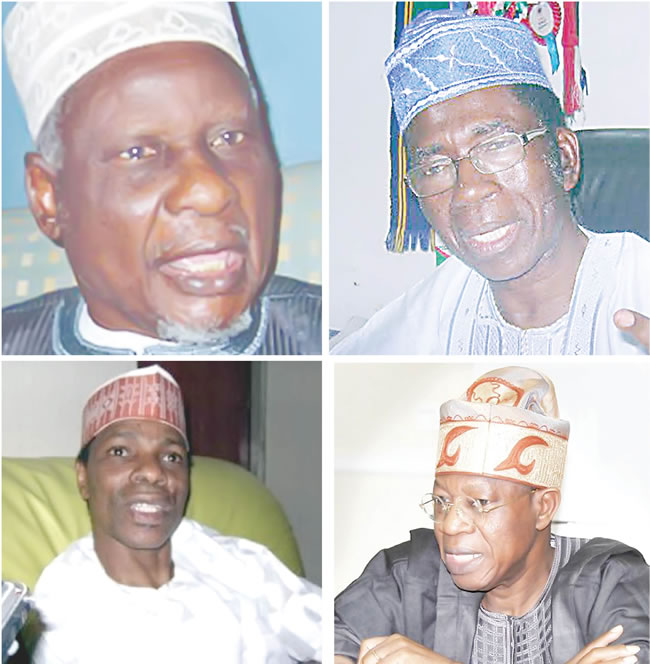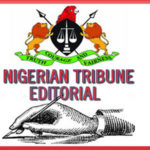As the authorities embark on various initiatives, including the conduct of town hall meetings anchored by the Ministry of Defence to douse tension in the country, KUNLE ODEREMI and SUNDAY ADEPOJU look at the crux of the matter, as well as suggestions by eminent persons on the way forward.
NIGERIA seems to be going through another troubled time. There is pervasive anger across board with bottled emotion, threats and counter-threats to the nation’s umbilical cord. And to avoid the situation from getting to a tipping point, the political leadership of the country is at its wits’ end in the bid to calm frayed nerves. From the North to the South, the East to the West, Nigerians admit their country is hanging on a cliffhanger. Main stakeholders, including former presidents, heads of state, traditional rulers and other categories of senior citizens, at different times raised their voice loud in that regard; they are unanimous on the need to apply the break and fashion the way forward for the world’s largest Black nation. The only point of departure among the leaders is the approach towards resolving the variegated conflicts that appears to be holding Nigeria down.
Former President Olusegun Obasanjo and ex-Head of State, General Abdulsalami Abubakar, foremost traditional rulers and Christian and Islamic clerics have individually or collective expressed deep concern on the depressing state of insecurity in the land, proffering what, in their opinions, constitute realistic steps in the bid to restore normalcy. Even though some of the views triggered a chain of reactions, either commendation or condemnation in different circles, the preponderance of the opinions is that there is still much work to be done in order to stabilise the polity. Almost in all facets of life, the country appears to be in a dire strait. The economy is in trouble with galloping inflation inflicting untold hardship on the citizens. The pressure from the economy has crystallised in a steady rise in the number of people falling into poverty bracket, while the rate of inflation has made a mince meat of a national minimum wage negotiated by the organised labour on behalf of workers. The macro-economy remains import dependent despite years of a vaunted diversification agenda by successive administrations. The prolonged war on insurgency in the North-East of the country constitutes a drainpipe for a substantial portion of the nation’s resources that should have been channeled towards re-inflating the economy and injected into the provision of basic infrastructure and social welfare packages for the most vulnerable in the segment of the population.
Most terrifying is insecurity manifesting in not just in the virulent activities of Boko Haram, but also in the despicable degree of criminalities: banditry, cattle rustling, mindless killings, kidnapping and abduction. The gruesome killings by criminals that have infiltrated the ranks of itinerant herdsmen took the country to a near tipping point. The accusations and counter-accusations by various concerned citizens have compounded the widespread tension, uncertainty and apprehension that characterised the polity over the years.
However, senior citizens are undaunted that the raging storm will soon give way to calm for the steady sail of the ship of state. Prominent citizens like Second Republic presidential adviser, Alhaji Tanko Yakassai, are optimistic that Nigeria will survive the wave of turbulence, emerge stronger and better to retain its prime position in the comity of nations. He said despite all challenges on ground, he remains “committed to a united Nigeria because I know a united Nigeria is in the interest of every Nigerian.”
Another senior citizen and astute politician, Alhaji Shuaib Oyedokun, put the prevalent situation across the country into a proper perspective. He believed the crises threatening the fabrics of the nation could not be divorced from the prevailing harsh economic realities. “What we are tasting now is completely complex and multifaceted. They are all rising from bottom up. They are ignited by hunger, as the hungry man is angry, while nothing seems to be working well for them,” he said. The elder statesman bemoaned that the country today does not represent the Nigeria of the dream of the founding fathers and other generations that came after t hem.
A former presidential aspirant and minister, Professor Tunde Adeniran, said it was obvious that the country was now in a state of emergency, which President Muhammadu Buhari has a key role to play towards restoring normalcy. He noted: “Quite unfortunate and depressing that it took a long time and the loss of many lives and property before many of our leaders in government woke up to the reality that anarchy, uncontrollable bloodshed and ruination were about to envelop Nigeria and consign the entity into history! Thank God many are beginning to, at least, see aspects of the prevailing dangers and the looming catastrophe. We have passed the stage of accusations and counter-accusations, partisan antagonisms or North/South divisions. We are in a national emergency. While the president has the most crucial role to play, to be complemented in the states by the governors, our situation has become so serious that it calls for unity of action among all categories of leaders – political, religious, corporate or business, professional as well as civil society organizations and traditional leaders from all parts of the country to form common fronts and face the common enemy. Those to fight collectively are the bandits and the criminals operating across the country in the forests and on the roads kidnapping, maiming, raping, extorting ransom, killing and destroying the means of livelihood of Nigerians. And so much needs to be done by our legislators and the law enforcement agencies.”
Son of Second Republic President Shehu Shagari, Alhaji Mukhtar Shagari, also proffered the way forward in the misty climate that has enveloped the country. The former minister of agriculture insisted on mutual dialogue between leaders from the North and their southern counterparts towards breaking the apparent logjam. He expatiated on his advocacy: “It is heartwarming that northern governors and leaders are meeting in Kaduna to address the problem. It is my advice that southern governors and leaders should do the same, after which all the governors come together and discuss the issue with a view to finding lasting solutions to the problem.” A former vice president of the Nigerian Bar Association (NBA), Monday Ubani, suggested a holistic review of the constitutional framework of the country to resolve the seemingly endemic challenges. He quipped: “Restructure; change the mode of governance and watch Nigeria leap to glory. The present structure is fundamentally flawed and defective.”
Already, a lot of politicians have embarked on horse trading preparatory to the general election that is about two and half years away. They seem most preoccupied with inordinate ambition without taking cognizance of the importance of security and stability of the system, as there cannot be development without the system being secured. According to the governor of Benue State, Samuel Ortom, such individuals are only deluding themselves by trying to jump the gun ahead of the election year. He said: “As I talk to you now, I will be a mad man to be talking about 2023. And if anybody comes to me to talk about me, I will send him away from my office.”
Town hall meeting as panacea
The intensity of the charged atmosphere is underlined by the multiplicity of panic measures being embarked upon by the authorities at various levels of leadership and government. Many of the steps are reminiscent of actions that followed the aftermath of the youths’ protests across the country against police brutality last October. While state governors, across party lines, are now involved in peace talks to douse the tension, other major stakeholders have engaged in perceived pragmatic measures and other forms of trouble-shooting to calm frayed nerves and fix the system. The novel concept of the ongoing town hall meeting at the instance of the Minister of Defence, Major General Bashir Magashi (retd), was popularised by the Minister of Information and Culture, Alhaji Lai Mohammed. It is on record that dozens of similar town hall talks initiated by the minister have been conducted throughout the six geopolitical zones in the country, and they are often monosyllabic in agenda. For example, separate editions were designed to showcase the achievements of the first anniversary of the Buhari administration or the war on corruption. In a speech he delivered at the special town hall meeting on the fight against corruption in Abuja on November 7, 2019, Lai Mohammed explained that his ministry launched the series of meeting in Lagos on April 25, 2016 “to provide a platform for the Federal Government to regularly give account of its stewardship to the people, get a feedback and input from them and, overall, to enhance citizens’ participation in governance.” In the edition held in the South-East, the minister added: “It’s not so much about the government explaining its programmes and policies but also about those who are governed expressing their satisfaction or dissatisfaction. What I found today is that there is a lot of misconceptions and prejudices, which this kind of platform will throw more light on.”
Beyond the ongoing panicky actions are the issues some of the impact and achievements that resulted from similar steps embarked upon to stabilise the polity in the recent past. Again, some elders spoke on the need to address the root of the frequent frictions and conflicts that bedevil the country. Alhaji Shagari expressed concern over the simmering conflicts and cautioned against inflammatory utterances capable of compounding tension. He said: “For me, we are in a very serious and critical period in the history of this great nation. Our unity and security, as well as our democracy, are on a very shaky ground. My position is that instead of counter accusations and inflammable utterances from both sides of the divide, both the governors and elders all over this country must concentrate their energy and time on finding lasting solutions to this problem that has the potential of tearing our country apart. The Federal Government must come alive to its constitutional responsibility of ensuring security, peace and unity in this country. It is time to act. It is heartwarming that northern governors and leaders are meeting in Kaduna to address the problem. It is my advice that southern governors and leaders should do the same, after which all the governors come together and discuss the issue with a view to finding lasting solutions to the problem.”
But, Yakassai, blamed the tension in the country on “some people in the South-West who are hell bent” in their opposition to the oneness of the country, “regardless of what other people in Nigeria think about the unity of the country. My belief is that the North benefits the least from the unity of Nigeria. Despite that I am committed to a united Nigeria because I know a united Nigeria is in the interest of every Nigerian.” The general secretary of the Yoruba council of Elders (YCE), Dr Kunle Olajide, was of the view that the country seemed overwhelmed by security challenges. He said the way forward for the country was “to go back to the basics: two bills to be presented to the National Assembly without delay; with first imputing referendum in our constitution, second, for the constitution of Constituent Assembly Commission to organise elections to the constituent assembly that will have the responsibility of writing a new constitution for the country; the new constitution will be presented to the Nigerian people on a referendum for ratification, not to the National Assembly. The president must address Nigerians; we want to know his position. The country needs leadership now.”
Alhaji Oyedokun is furious about the way things had been turned upside by state actors what was bequeathed by the founding fathers of Nigeria. He queried: “Nigeria now? You are asking me to assess a country like a ship in the high waters whose captain has dropped the compass into the vast ocean? I recall in 1978/79 when Chief Richard Akinjide wrote an open paragraph to the Constitution of the National Party of Nigeria (NPN), he started with a clause that still remains fresh with me: ‘Nigeria, a country where nothing seems to be working well.’’ If he was alive by this February 2021, almost half a century after, certainly he would not want to call it a Nigeria of our dream. This is serious. The cloud of confusion is thick in the air, but it can be dispelled if only the ruling party would wake up from this worrisome slumber, and the current craze for revalidation of membership, which is even causing problem now. Nigeria has passed through a lot of political upheavals by the political class much easier to control once the handlers called their men to order. What we are experiencing now is completely complex and multifaceted. They are all rising from bottom up; they are ignited by hunger and the hungry, as the hungry are angry, while nothing seems to be working well for them. The only solution is for the president and the presidency to tighten the belt and embark on serious peace moves, meaningful but not cosmetic political education. Let Mr President come out as a father figure to be seen as being ‘for nobody and to everybody.’”
For a legal practitioner and political leader, Chief Supo Shonibare, there is no reason for the country to be in the current predicament given the high standard of the founding fathers. He offered his opinion on possible solution: “The way forward is our addressing the defective nature of the structure and the constitution setting out the rules for governance. Until we restructure and devolve political powers to the federating units, we will continue to be plagued by political, economic and ethnic tensions and discord.” According to him, it is appalling that instead of contributing and being part of the vocal agitators for the imperative of a devolved polity, leading political rulers from the South too are more interested in political power and not the template for a stable, settled polity because “we just have totally dishonest unpatriotic rulers at the helms of affairs at all tiers.” He added: “Unfortunately for our polity, the political leadership in our country is comprised of rulers who lack the patriotic attributes of our founding fathers – Chief Obafemi Awolowo, Dr Nnamdi Azikiwe and Sir Ahmadu Bello, with their colleagues. We currently do not have visionary, patriotic leaders.
“Our founding leaders imbibed the culture of propriety and selfless service as the covenant for seeking political power, as well as their perception of governance. These were settled issues. We no longer appear to have settled norms with rulers capable of taking the higher moral ground in their action and responses to critical germane issues, which are capable of being the catalyst for the collapse of the Nigerian entity. Why can’t this farmers-herdsmen issue and the attendant violence in the mix be identified as a separate dangerous national security issue? Why are the herdsmen’s militia often compared with the self-determination struggle of the people of the South-South to have more share of their crude oil resources? Why will the Bauchi governor imagine that cattle rustling is a reasonable justification and defence for individuals to resort to self-help in bearing illegal automatic firearms to protect their assets, when the criminal acts occasioned with the use of these weapons in many parts of the country is well documented?. He even compounded his inane rhetoric by going on to compare the criminals perpetuating these acts, who are rightly being asked to leave parts of the country where they have unleashed mayhem, with other law abiding citizens from other states residing in Bauchi? Classical non sequitor! When one also raises the issue of devolution of powers or restructuring as the anecdote to the plethora of political and economic challenges in the polity, instead of contributions to the dialogue and the various template for the structure for a devolved entity and the need to abandon the unitary system that has also contributed to the ethnic tensions and suspicion in the polity, these rulers feign being ignorant of what devolution of powers and self-determination mean.”
As the various authorities intensify efforts through the town hall meetings and other forms of high-level consultations on a roadmap for sustained peace and stability, other critical stakeholders in the Nigerian project are likely to key into the conversations and consensus building drive.
YOU SHOULD NOT MISS THESE HEADLINES FROM NIGERIAN TRIBUNE
We Have Not Had Water Supply In Months ― Abeokuta Residents
In spite of the huge investment in the water sector by the government and international organisations, water scarcity has grown to become a perennial nightmare for residents of Abeokuta, the Ogun State capital. This report x-rays the lives and experiences of residents in getting clean, potable and affordable water amidst the surge of COVID-19 cases in the state.
Selfies, video calls and Chinese documentaries: The things you’ll meet onboard Lagos-Ibadan train
The Lagos-Ibadan railway was inaugurated recently for a full paid operation by the Nigerian Railway Corporation after about a year of free test-run. Our reporter joined the train to and fro Lagos from Ibadan and tells his experience in this report…
ICYMI: Nigeria Back Into Recession, Worst Since 1987
Nigeria is back into a recession. This time, it is the worst the country has experienced since 1987…
ICYMI: Salami Panel Wants Magu, Other Policemen In EFCC Removed
President Muhammadu Buhari has received the report of the judicial commission of inquiry on the investigation of Ibrahim Magu, the suspended acting chairman of the Economic and Financial Crimes Commission (EFCC), headed by Justice Ayo Salami (retd)… | police helicopter to Oyo | police helicopter to Oyo | police helicopter to Oyo






